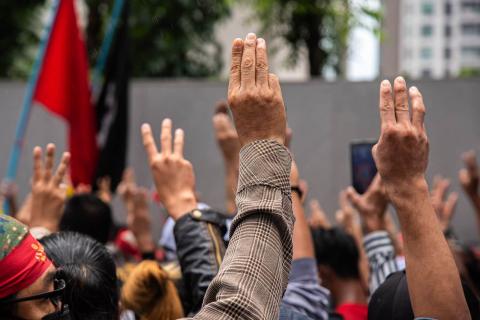This is the final in a series of three articles on the Rohingya crisis, featuring Morten Pederson on the domestic drivers of conflict, and Nicholas Farrelly on the consequences for neighbouring Bangladesh.
There have been a small number of militant Muslim groups in Myanmar, but they were usually weak and disorganised. A few had tenuous international links, mainly to Islamists in South Asia, but these ties had no appreciable impact on their goals or operational capabilities. When international groups recruited Rohingyas, as they did occasionally, they tended to be from exile communities in countries such as Pakistan.
Most Rohingyas in Myanmar kept their heads down and tried to avoid being noticed by the central and Rakhine State governments, and the local Buddhist population. Their focus was on staying alive, and if possible improving their lot, not the overthrow of the regime. Indeed, most Rohingyas saw violence as counterproductive.
In 2012, however, an outbreak of sectarian violence in Rakhine State encouraged the formation of the Arakan Rohingya Salvation Army (ARSA) by a group of Rohingya exiles. Its attacks against Myanmar’s security forces in the state’s north in 2016 and 2017, and the subsequent exodus of over 750,000 Rohingyas to Bangladesh, dramatically changed the picture.
These developments have prompted three questions:
- Are more Rohingyas, either inside Myanmar or outside it, likely to be radicalised by recent events and turn to terrorism?
- Are Rohingyas and their supporters likely to be recruited by international Islamist groups for terrorist activities?
- Will Islamist groups, both in the region and further afield, take up the Rohingya cause and launch terrorist campaigns with their plight in mind?
Violent extremism stems from a kaleidoscope of factors, which create infinite individual combinations. However, it is possible to identify several factors that are usually found in processes of political radicalisation. Specific circumstances such as the presence of a charismatic preacher or recruiter can be critical.
Looking at the refugees in Bangladesh, almost every factor identified by radicalisation experts can be found, to a greater or lesser degree. This is partly due to the harsh treatment of the Rohingyas before 2016, but much more so as a result of their brutal expulsion from Myanmar, described by the UN as ethnic cleansing, and probably genocide.
This has made the Rohingya refugee camps in Bangladesh potential breeding grounds for extremism.
Looking at the refugees in Bangladesh, almost every factor identified by radicalisation experts can be found, to a greater or lesser degree.
Counting the 250,000 Rohingya refugees in Bangladesh before 2016, there are now over one million desperate and effectively stateless people living in squalid camps, entirely dependent on foreign aid. Despite discussions between Naypyidaw and Dhaka, there is no chance that they will be repatriated soon, even if it was safe for them to return home.
The refugees, a large proportion of them women and children, currently seem preoccupied with their daily survival. There are no obvious signs that they are about to embark on an international campaign of violence. However, it would only take a very small percentage of them to be radicalised for there to be a major security problem.
As the International Crisis Group (ICG) has stated, ARSA does not appear to have a pan-Islamist narrative. Also, ARSA has been at pains to emphasise that it “has no link with any terrorist group around the world”. Even so, questions remain over ARSA’s external connections.
There have been reports of “a smattering of foreigners” in ARSA’s ranks, hailing from South, Southeast and Central Asia. Also, several observers have pointed out circumstantial links between ARSA and other extremist groups, including global organisations such as ISIS and Al Qaeda.
Even if Islamist links to the Rohingyas were marginal before 2016, the potential now exists for them to be developed. There is a risk too that radicalised Rohingyas will be recruited by international terrorist groups. Also, Muslim communities in South and Southeast Asia have been outraged by the treatment accorded to their co-religionists in Myanmar, making them vulnerable to Islamist recruiters.
The dire situation in Myanmar and Bangladesh has already attracted the attention of various extremist groups, prompting the former Malaysian prime minister to warn of a serious security threat to the entire region. In Singapore last month, Aung San Suu Kyi pointedly warned the “terrorism” that sparked the Rohingya crisis could spread beyond Myanmar.
Before 2016, the Rohingyas’ plight was not a major concern for Islamist groups, but the dramatic events of the past two years, and the publicity given to the refugees, are prompting greater attention. There is also the possibility that foreign fighters may be attracted to the region, as occurred in the Philippines, to open new Islamist fronts.
In addition to ISIS and Al Qaeda, most South and Southeast Asian extremist groups have already been linked to the latest Rohingya crisis in some way. For example, there have been media reports of hundreds of jihadists from regional countries training for terrorist operations in Myanmar, or being put on standby to go to Bangladesh.
It is not clear if any of these reports are accurate, but the possibility of increased terrorist activity in the region on behalf of the Rohingyas needs to be taken seriously.
The ICG believes the Rohingya crisis is a “game changer” for Myanmar. The violence in Rakhine State in 2016 and 2017 was qualitatively different from anything seen before. It also occurred in a more inter-connected world, with a greater potential to influence others. It has already changed the region’s strategic environment.
An increased terrorist threat is not inevitable, if the Rohingya crisis is handled sensitively, adequate practical assistance is provided, and the refugees in Bangladesh are given reason to hope for meaningful change. Such measures would not eliminate the danger of future terrorist attacks, but they could significantly reduce it.
Unfortunately, there are no signs of anything happening along those lines. Hundreds of thousands of Rohingyas are doomed to remain in Bangladesh for the foreseeable future, under terrible conditions, with all the attendant risks of radicalisation and exploitation, in Myanmar and beyond.
Image via Flickr user Surian Soosay

